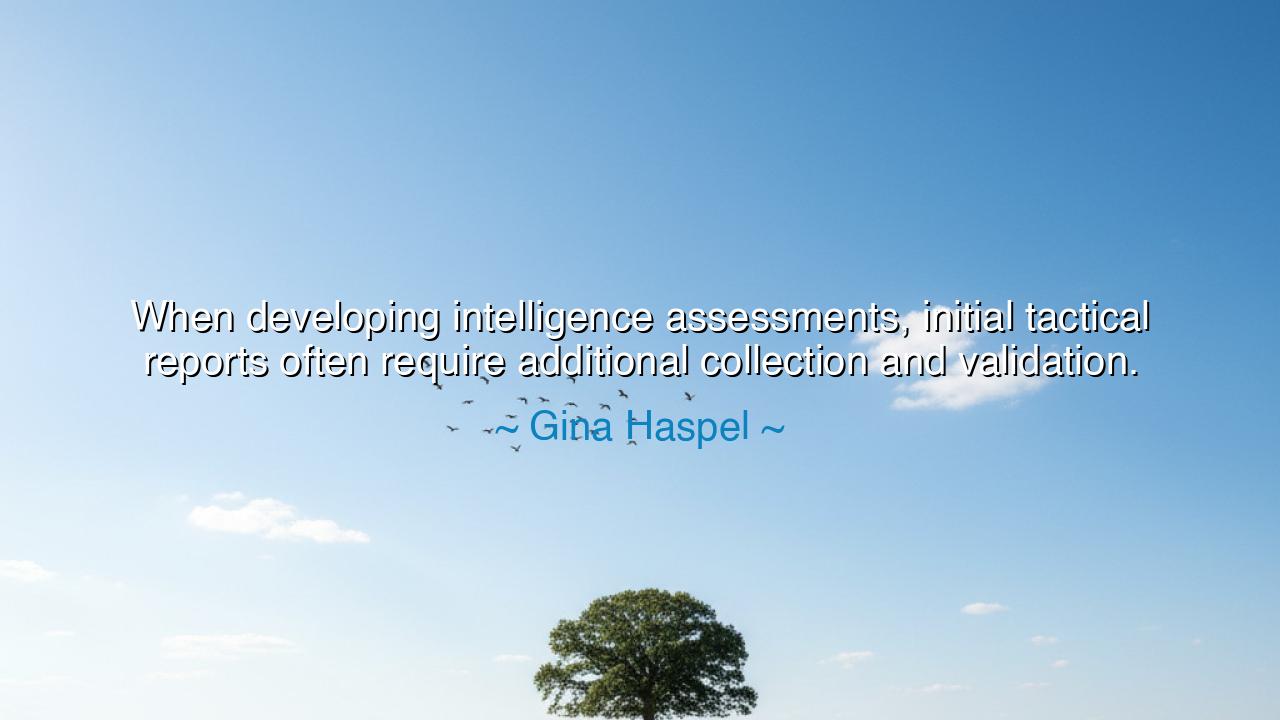
When developing intelligence assessments, initial tactical
When developing intelligence assessments, initial tactical reports often require additional collection and validation.






In the wise words of Gina Haspel, "When developing intelligence assessments, initial tactical reports often require additional collection and validation," we are invited into the intricate and sometimes arduous process of gathering, analyzing, and refining intelligence. Haspel speaks to the core of the intelligence community’s work—how initial reports, which may provide valuable insights, are never complete on their own. They must be verified, examined, and sometimes reexamined with fresh data before they can be trusted. In this way, the process of intelligence gathering mirrors the ancient wisdom of truth-seeking: the journey toward understanding is always one of discovery, reflection, and refinement.
This principle of validation and verification is as old as human inquiry itself. The Greeks, especially Aristotle, valued the process of rational inquiry and methodical examination. For Aristotle, the quest for knowledge was not an act of simple acceptance but of careful examination, testing, and evaluation. He understood that knowledge was always in motion—subject to change, improvement, and new insights as the process of inquiry deepened. Similarly, Haspel’s statement suggests that intelligence is not something static or absolute but a fluid, evolving process that must be repeatedly tested against new data, contexts, and experiences.
Consider the example of Alexander the Great, whose military campaigns were often guided by intelligence that came from a variety of sources. In the early stages of his campaigns, reports about enemy movements were sometimes incomplete, inaccurate, or misleading. As a result, Alexander and his generals had to continually verify and validate the intelligence they received, adjusting their strategies based on newly collected data. One of Alexander’s greatest strengths was his ability to take initial intelligence reports and refine them, often acting on incomplete information but always improving his decisions through continuous evaluation. His success as a military leader was rooted in his ability to validate intelligence and respond dynamically to shifting realities on the battlefield.
The value of validation in intelligence is seen again in World War II during the Battle of Midway. The success of the American forces was in large part due to the ability of the U.S. Navy to refine their intelligence. Early reports on the movements of the Japanese fleet were fragmented and uncertain, but through additional collection and validation, they were able to confirm the location of the fleet and plan their attack accordingly. The intelligence was not a final answer—it was an ongoing process of data gathering and refinement. This attention to detail, this ongoing effort to verify information, ultimately led to one of the most decisive victories of the war. It was not the initial report that brought success, but the process of validation that ensured victory.
Haspel’s insight also touches on the human element in intelligence work—the uncertainty that accompanies early reports. Intelligence is not an exact science, and initial assessments are often fraught with ambiguity. Just as the ancients understood the importance of seeking wisdom from multiple sources, modern intelligence work demands the same level of scrutiny and multiple perspectives. In many ways, the process of validation is a reflection of the human condition itself—imperfect, often unclear, but ever-moving toward truth. It reminds us that the search for knowledge is not a linear path but one filled with twists, turns, and the need for constant adjustment.
The lesson here is one of patience, diligence, and flexibility. In our own lives, we must recognize that initial assessments of any situation—whether in our careers, relationships, or personal ambitions—are rarely the final answer. Just as intelligence requires validation and re-examination, so too do our perceptions and decisions. The quest for truth and understanding demands effort and re-evaluation. We must be willing to adjust our course, to gather more information, and to question our assumptions. Only through this process can we reach deeper clarity and insight.
In practical terms, we must embrace the ongoing process of evaluation in our personal and professional lives. We should not accept initial impressions or reports as absolute truth but actively seek to validate and refine our understanding of situations. Whether we are working on a project, making a decision, or navigating a complex situation, we must be willing to collect additional data, reflect on it, and adjust our actions accordingly. Just as Haspel emphasizes in the realm of intelligence, our decisions and actions are strengthened when they are based on verified and well-rounded information. By embracing this approach, we can ensure that our choices are not merely based on assumptions, but on a thorough and well-considered understanding of the world around us.






AAdministratorAdministrator
Welcome, honored guests. Please leave a comment, we will respond soon